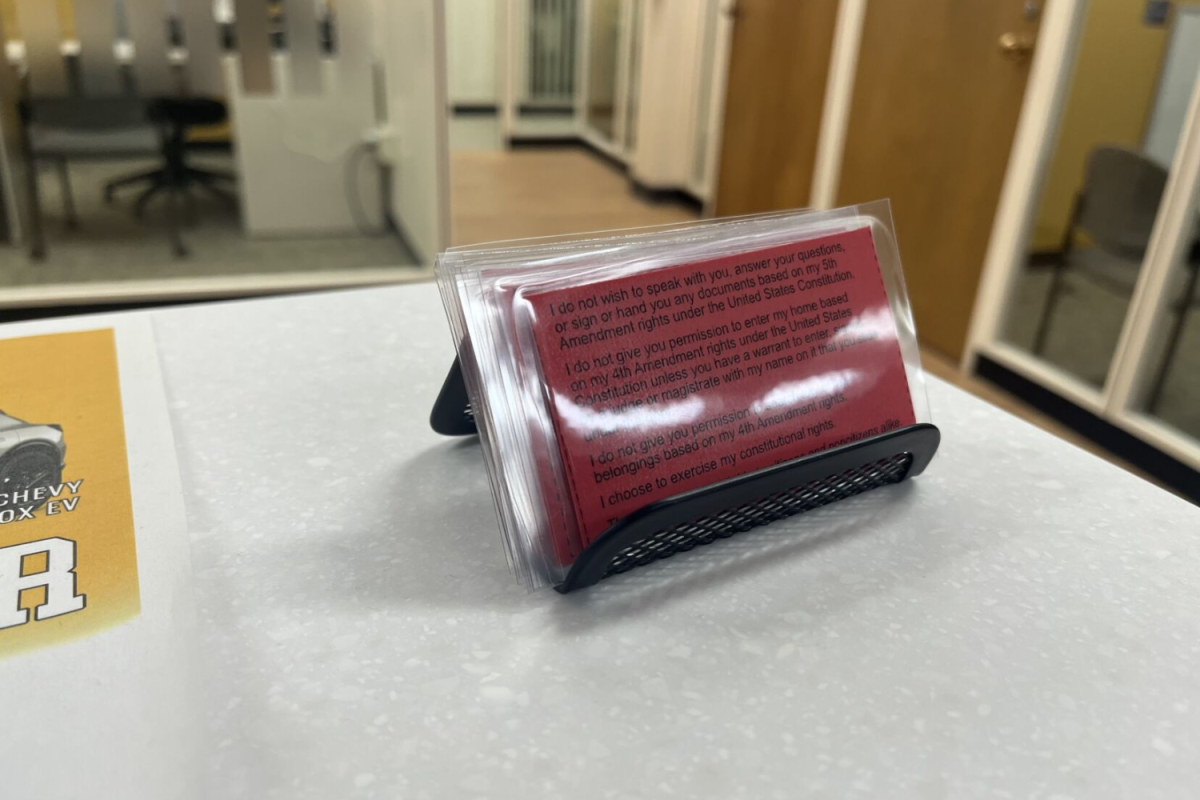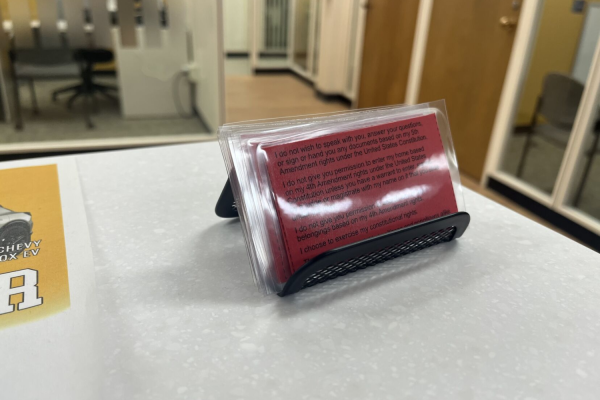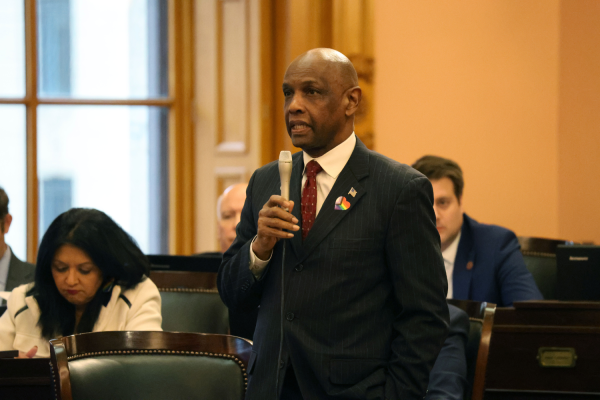Transgender student athletes give moving public testimony against Ohio’s proposed trans sports ban
With the support of parents, allies, advocates and experts, trans athletes spoke at length about the immense joy and sense of belonging they experience participating in team sports.
Editor’s note: This article was originally published by The Buckeye Flame.
On Wednesday, April 19, in the morning, transgender student athletes from across the state gave public testimony at the Statehouse opposing Ohio’s most recent version of a transgender sports ban. With the support of their parents and allies, as well as Ohio LGBTQ+ advocates and experts, the transgender student athletes spoke at length about the immense joy and sense of belonging they experience participating in team sports.
Ohio’s proposed transgender sports ban was introduced as legislation by Ohio Republican Jena Powell (R-Arcanum) in 2020. Dubbed the “Save Women’s Sports Act” by its conservative sponsors, the ban is currently written into House Bill 6 and being heard before the Ohio House’s Higher Education Committee. If enacted, it would bar transgender girls from participating in girls’ sports from kindergarten through college.
At the hearing, the athletes talked about the importance of sports in their lives, dispelled myths and explained the extra requirements they must already meet to compete.
‘It helped me bloom’
Connor McLaren is a proud transgender girl and a valued member of the field hockey team at her Ohio high school.
When transgender girls begin taking hormone blockers before they enter puberty, like McLaren did, their hormone levels often match or fall below cisgender girls competing in the same age group.
Typically, transgender teens who undergo hormone replacement therapy progress through puberty at the same rate as their cisgender peers.
Still, McLaren submits extra medical information to the Ohio High School Athletic Association (OHSAA) each year to prove she is not competing at an advantage, including a signed letter from her primary care physician and blood test results detailing her hormone levels.
“Playing a sport in high school isn’t just about winning. It’s that feeling of belonging,” she said. “By passing this bill, you’ll be depriving kids like me the opportunities to feel that sense of belonging when they need it most.”
“The most important lesson I learned playing field hockey is learning how to fail,” McLaren told committee members. “Learning how to accept defeat, how to push myself even when it’s hard. I’ve learned to work past obstacles. It made me feel less worried about openly expressing who I was and it helped me bloom into who I felt like I wanted to be.”
Rules for trans athletes already in place
For Ember Zelch — and many other transgender student athletes — the joy, fulfillment and acceptance she’s experienced as part of her high school’s softball team far outweigh the danger in being singled out by adult coaches, administrators, parents and politicians
OHSAA’s standards for transgender athletes currently require transgender girls and women to undergo hormone therapy for at least one year in order to compete against cisgender girls.
Now playing her senior season, Zelch sat on the sidelines for three years while waiting to meet those standards.
She recounted the moment she finally received OHSAA approval to play on her high school team, telling committee members that she and her mother both burst into tears.
“I’m here today trying to defend not just my right to finish my senior year with my team, but the right of all trans athletes to participate in the sports they love,” Zelch said. “My teams are part of my family … Every kid should be lucky enough to have this experience.”
What is a competitive advantage?
Mallory Golski — civic engagement and advocacy manager for Kaleidoscope Youth Center in Columbus — also gave public testimony dispelling common myths concerning competitive advantages.
Golski is herself a lifelong competitive swimmer, with several years of experience coaching both transgender and cisgender young people in the pool.
“Assuming that all people who were assigned male at birth will naturally be stronger, faster or generally more athletic than those assigned female at birth is insulting to all female athletes — cisgender and transgender alike,” she said, describing the vast difference in ability among athletes of all genders.
“Having a particular body type could lead to some competitive advantages,” Golksi added, pointing to Olympic gold medalist Michael Phelps’ unusually wide wingspan and low lactic acid production as clear physical advantages over his competitors.
She also discussed trans swimmer Lia Thomas, who caused controversy with her 2022 NCAA Division I championship win in the 500 freestyle. Still, Thomas’ time was about nine seconds slower than Olympic gold medalist and current world record holder Katie Ledecky, who is a cisgender woman.
“Even transgender athletes competing at the elite collegiate levels aren’t guaranteed to shatter records,” said Golski. “Transgender women are women, and they deserve the chance to compete at all levels of competition alongside their cisgender female peers.”
Trans youth educate lawmakers
Largely, public testimony in favor of HB 6 has been littered with misinformation and transphobic language.
On March 29, during the bill’s second hearing, supporters routinely cited scientifically inaccurate information concerning sex chromosomes, sex hormones and primary and secondary sex characteristics when discussing alleged competitive advantages among transgender athletes.
On Wednesday, several committee members still struggled to use appropriate and respectful language when speaking to and about transgender girls and women, even after hours of public testimony and countless written testimony submissions.
Zelch — who hopes to finish her senior season and continue her softball career at the collegiate level — ended her testimony with a direct plea to transgender Ohioans, visibly moving Rep. Mary Lightbody (D-Westerville).
“I ask you not to give up,” Zelch said. “No matter what happens with this and other legislation that threatens to deny us our basic human rights, do not give up. Our rights matter. Our lives matter. You are all so brave and so beautiful. Don’t let anyone tell you otherwise.”
The Buckeye Flame is a platform dedicated to amplifying the voices of LGBTQ+ Ohioans to support community and civic empowerment through the creation of engaging content that chronicles their triumphs, struggles and lived experiences. Its Editor is Baldwin Wallace University professor Ken Schneck. Visit thebuckeyeflame.com.
The Exponent is looking for financial contributions to support our staff and our newsroom in producing high-quality, well-reported and accurate journalism. Thank you for taking the time to consider supporting our student journalists.






































